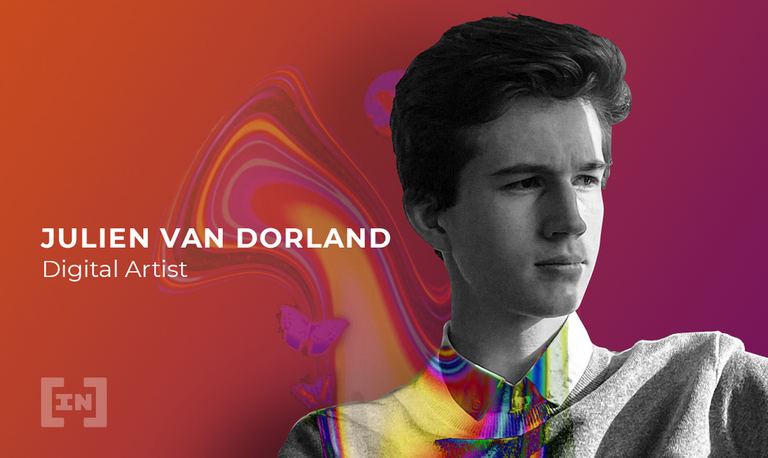BeinCrypto spoke to Julien van Dorland, digital artist, and avid non-fungible token (NFT) art collector, about his work, his collections, and the NFT space as a whole.
Van Dorland is a digital artist, an NFT art collector, and founder of Arvable, a digital agency helping artists explore the metaverse and NFTs.
Completely immersed in the NFT space, van Dorland is the perfect example of what the future holds when it comes to creating the metaverse. With involvement in almost all elements of the NFT value chain, van Dorland is at the center of this still-growing space.
Entering the NFT game young
At only 20-years-old he is already an impressive NFT art collector and artist. However, the art came before the NFT boom.
“I started in 2014, creating motion design myself. I’m an artist and a digital creator, but also an NFT collector. I started it in 2014 grading motion design, graphic design. I was 14-years-old at that time,” he explains.
“That really snowballed from there, around 2020 I saw the NFT space growing. I felt like, oh I need to jump in. In early May, I saw it happening already. I saw different artists talking about it, that I follow on Instagram. I just joined one of their Discord servers and communities on Twitter, and it really just started from there.”
Unlike many who have come to NFTs, van Dorland hadn’t been involved in cryptocurrencies until this point.
“I started collecting on Nifty Gateway. [It’s] easy to start with because you pay with a credit card. That was really the decision to jump on it, and I didn’t really use crypto before. So, the NFT space made me use crypto, and that was really interesting,” he explains.
Modern day art collectors
This introduction to art collecting from a young age is novel, as the traditional art world has a significant monetary barrier to entry.
However, Van Dorland and his 18-year-old brother now have a joint collection on Nifty Gateway that holds pieces from some of the biggest names in the NFT art world. These include works by Pak and Fvckrender.
“I also own a Damien Hirst, one of his NFT projects. So yeah, we really have some of the top, blue-chip artists in our collection right now.”
However, while these are impressively priced pieces, van Dorland had a pretty steep learning curve when it came to the value of these emerging artists. Discussing a Beeple piece, he explains how he sold the artwork well before it had even reached its peak.
“We just purchased one for $1, and we were jumping around when we sold it for $1900. It was a lot of money at the time [but] we had no idea what was going on in this NFT space.”
“Communities are very important an NFT project for an artist to succeed overall”
For van Dorland, NFTs are not just about the ownership that each piece entitles you to. He also sees it as a crucial community-building tool that is bringing people together.
“Back in the day, you saw an artist’s on Instagram. You really couldn’t connect with them like through DM’s. So I think the community is really changed in that you can connect with the artist right now. You can DM them, you can have a conversation with them, ask them questions. That wasn’t really possible back in the day before NFTs.”
Much of this community is built on Discord rather than the previous hub on Instagram. These channels serve as a bonus to the art collectors buy, granting them access to the artist.
“When you own an NFT from them, you can receive or verify your ownership through a bot, a tool on an insider community that they can verify that you own something, and then you get access to like a secret channel, and the artists,” he explains.
“If they do it right, and are really active in that channel, you can really connect with them. I think that’s very important, communities are very important an NFT project for an artist to succeed overall.”
A jumping off point for new artists
For van Dorland, this community aspect is especially important for new artists entering this digital space.
“As a new artist, I would definitely suggest they join a community. Be active there, show your work, connect with people that are already known in this space. Ask questions, get to know that technology. That’s very important because I see a lot of artists that jump into the space that have no idea about this tech and how it works.”
As a moderator in these communities, he often sees artists lacking understanding when it comes to something even as fundamental as minting their pieces.
“One thing I really see is that artists are trying to mint their NFT, and they have a low gas price. So they always ask me, like, why is this transaction taking so long and 99% of the time it’s that they have a low gas price and that the gas fees went up. So trying to learn and understand how to speed that up, it’s very important,” he says.
NFTs future utility
When looking at what’s next, van Dorland focuses on utility. This is an aspect of NFTs often considered, as many still don’t see tangible value in owning a piece of digital art.
“Definitely, more utility will be added. The metaverse will grow, like Decentraland is already popping up, communities and being built there. Right now, it’s still the artists really pushing it forward,” he says.
“Brands are watching this space, they’re pushing it forward, they’re making it accessible to their community, and they’re following, and I think it will grow from there.”
